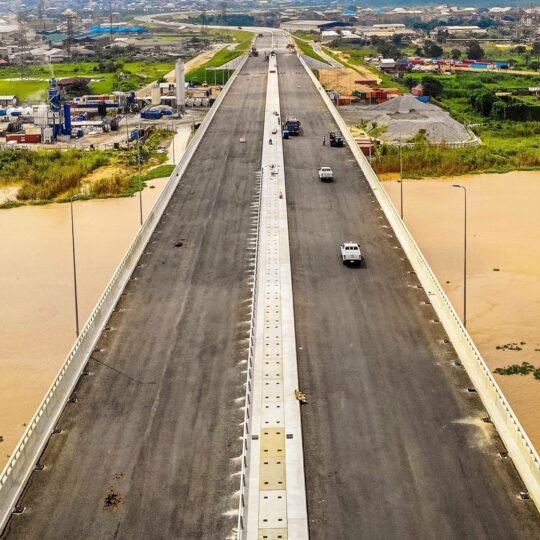By Zayd Ibn Isah
Few things demonstrate the appalling actions of vandals on the Second Niger Bridge and other public infrastructures across the nation like a particular video which surfaced online recently. In the video, a man is shown tirelessly removing water out of a submerged boat while a woman pours water back into the same boat.
Although this was meant to be a comic video, I couldn’t help but recognize just how it starkly illustrates one of lifeʼs Sisyphean realities. Simply put, this is when someone’s effort at setting things right is undermined and made to appear futile by the destructive actions of others.
I understand some of us might blame the actions of the vandals on hunger and lack of employment opportunities, but removing iron coverings from canals and destroying other infrastructures like pipelines and street lights, built with taxpayers’ money, does not justify the actions of the criminals. Eventually, it is innocent commuters working hard to add value to their lives, rather than resort to criminality, that would bear the consequences of these dastardly activities.
According to Bennet Oghifo and Rebecca Ejigorma, in a 2012 ThisDay article titled “Nigeria: Manhole Covers – a New Attraction for Thieves”, “There are gory tales of people disappearing without a trace after falling into manholes in the middle of some roads in Lagos. Others are injured after falling into these holes. Motorists have lost their tyres to these holes, some of which have jagged edges caused by unsuccessful attempts by thieves to remove their covers completely.”
Unfortunately, such acts of vandalism not only endanger lives but also disrupt essential services and infrastructure vital for the well-being of communities. The consequences extend far beyond the immediate inconvenience caused by damaged infrastructure. They affect public safety, economic stability, and overall societal progress.
In 2019, a fresh graduate of the University of Lagos, Adewura Lateefa Bello, was declared missing. After efforts were made to find her, it would later be discovered that she fell into an open manhole during a flood and was swept away. The tragic death of the beloved Adewura, as well as the termination of her dreams and hopes, is made all the more painful when we realize that she would still be alive today, if not for the negligence and insensitivity of several fronts.
For one, the wicked intentions of the vandal who removes the manhole cover for selfish gain, and then, the inability of officials in charge of road maintenance to quickly spot and deal with this, in ways that would ensure no one suffers from the criminalʼs actions. The blame extends even further to us road users who spot these glaring gaps and fail to report them. E no concern me, na government wahala.
Another online article, this one from The Daily Trust of 14 February 2022 , entitled “Inside Abuja’s Manhole Of Death”, exposed the dangers and environmental hazards of this form of vandalism. According to the article, these open manholes are all over Abuja, and often result in injuries to unsuspecting pedestrians. One of such victims recounted his harrowing tale of misfortune to The Daily Trust, saying that in trying to dodge a reckless dispatch rider, he ended up slipping into a manhole at Finance Bridge in the Central Area. In the article, the victim said, “Immediately I fell into the hole, the water almost reached my neck. I lost my phone and some personal belongings in the hole. I was lucky that a passer-by noticed when I slipped into the death trap, and for this, scores of Good Samaritans were involved in the tediously energy-sapping mission to save my life.” Another victim, as detailed in the same article, was less fortunate, having to be hospitalized for months in order to recover from injuries sustained after falling into an uncovered manhole.
There are similar tales to those ones, and as many have been fortunate to survive, there are others who died from the same avoidable misfortune, and only Almighty God knows if some persons declared missing, simply disappeared within these gaping holes. All of this is enough to fume at. No one deserves to fall victim to another person’s wickedness and negligence in this country of ours, this country which already gives many people untold hardship and suffering. It is high time we collectively reevaluate the value of a life in Nigeria, if only to assert the importance of protecting public property.
As much as law enforcement officials have been known to regularly apprehend the unscrupulous elements behind this rampant acts of vandalism, a lot of measures should be employed to curb the act itself and prevent unfortunate harm. Admittedly, installing CCTV cameras in public areas and adding trackers to public property might be steps beyond our current capabilities, but there are still some grounded measures appropriate for our level of enforcement and prevention. How about increasing police presence in areas prone to vandalism, especially during certain periods of high criminal activity? If law enforcement agents are stretched too thin, neighborhood watch groups can be brought in so that residents can help monitor and report suspicious activities.
The task of curbing vandalism is one that falls to all of us as Nigerian citizens, and as such, fostering bonds between law enforcement and local communities can result in a stronger deterrent to vandalism. Another proactive measure is in ensuring that rapid repairs and clean-ups are undertaken to protect commuters and pedestrians. Taking this further, awareness can be initiated to inform the public of this menace, especially the role that ordinary citizens can play in helping the authorities. And of course, stiff penalties should be the lot of apprehended vandals. Their activities represent only a slim aspect of what is negative about the Nigerian condition, but by punishing them, others can be discouraged from taking such desperate paths.
Ultimately, vandalism is a societal problem that extends beyond the removal of manhole covers, even including electrical installations, telecommunication cables and railway tracks. The task at hand might seem daunting by sheer scope alone, but it gets a bit easier when we all commit to it. We all have roles to play in this, and no effort is insignificant, because a simple good act might just be enough to save a life. And as I’ve stressed here, the life of one Nigerian is worth every measure needed to keep all of us safe.
Zayd Ibn Isah can be reached via lawcadet1@gmail.com

 Join Daily Trust WhatsApp Community For Quick Access To News and Happenings Around You.
Join Daily Trust WhatsApp Community For Quick Access To News and Happenings Around You.


